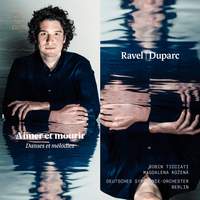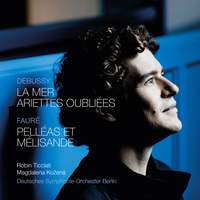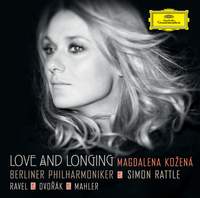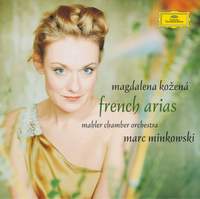Interview,
Magdalena Kožená on French song
 The Czech mezzo Magdalena Kožená made her name as a superb interpreter of baroque music and Mozart, but nineteenth- and twentieth-century French repertoire has been close to her heart since the early stages of her career; her 2003 album of French operatic arias remains a huge favourite of mine, and her recording of Ravel’s Shéhérazade with her husband Sir Simon Rattle and the Berliner Philharmoniker ten years later was shortlisted for a Gramophone Award.
The Czech mezzo Magdalena Kožená made her name as a superb interpreter of baroque music and Mozart, but nineteenth- and twentieth-century French repertoire has been close to her heart since the early stages of her career; her 2003 album of French operatic arias remains a huge favourite of mine, and her recording of Ravel’s Shéhérazade with her husband Sir Simon Rattle and the Berliner Philharmoniker ten years later was shortlisted for a Gramophone Award.
Last autumn she joined the Deutsches Symphonie-Orchester Berlin and their new music director Robin Ticciati on their debut recording of Debussy (singing the Ariettes oubliées in evocative new orchestrations by Australian composer Brett Dean); tomorrow sees the release of an equally captivating sequel, Aimer et mourir, with Kožená singing four of Duparc’s best-known mélodies alongside performances of Ravel’s second Daphnis et Chloé suite and the Valses nobles et sentimentales. I spoke to Magdalena a few days after her Proms performance of Shéhérazade, touching on the challenges of singing Duparc in these orchestrated versions, her relationships with the two Berlin orchestras, and whether more dramatic French repertoire might figure in her future…
You recently performed Ravel's Shéhérazade and L'enfant et les sortilèges at the BBC Proms, and two of his orchestral works feature alongside the Duparc songs on this new album - how different are the two composers in terms of their vocal writing?
Even though it’s all French music, of course, it’s really quite different - Ravel is extremely careful and delicate in the way he thinks about relationship between the voice and instruments, whereas Duparc was heading in a more Wagnerian direction. I’ve sung these arrangements in concert, but I found doing the recording a little bit easier in a sense, because you don’t have to struggle so much with the very heavy orchestration. Even though Duparc arranged some of them himself, he originally conceived these songs for voice and piano, and when he orchestrated them they became a good bit more dramatic. In terms of how you use your voice (especially in these orchestral versions), you really do have to approach Duparc as a Romantic composer who needs plenty of sound, and you also need to bear in mind that melodies are generally more important than the text, which is pretty much the exact opposite of Ravel! In Shéhérazade, for instance, the rhythm of the text follows the French intonation of the language as it is spoken: he sets it exactly as you would actually speak it, and that’s what I really love about singing his music. I was joking the other day about the fact that when I’m doing opera I almost prefer the recitatives to arias, because I like to tell the story rather than just producing beautiful sounds - though ideally you’ll be doing that as well!
Do you find that you make different interpretative choices when you’re performing these songs with an orchestra as opposed to in the original piano versions?
I try to approach things in the same way, but when you’re singing these pieces with a big orchestra you do need to compromise a little bit: you have to do whatever’s needed, because there’s no point in producing a beautiful pianissimo colour if nobody can hear you! But on the other hand, the orchestra itself usually adds much more colour than a piano, and you can take your cue from that – for instance, when you sing with a flute, you can allow a little more air into your voice to match the timbre of the instrument, and I love to play with things like that. I sang in a choir for my entire childhood, and that left a huge impression on me in that I always like to adjust to the bigger picture. I would never want to be the kind of singer who rolls up and says ‘Here am I: please accompany me!’: I like to listen and attune to what each instrument’s doing, and also to see what these particular players are bringing to the table. Every time you do a piece with a new conductor and orchestra or ensemble, it’s that little bit different, and I’m always open to spontaneous decisions! Of course I have a general idea of what I want to do, but some players can surprise and inspire you with a beautiful phrase shaped in a different way, and you think ‘Oh, maybe I could copy that!’. That’s when the music really becomes alive – I can’t imagine just preparing a score on my own in a practice-room and then thinking ‘This is how I sing it, job done!’.
You've worked with the Berliner Philharmoniker a great deal over the past decade, and are a relative newcomer to the Deutsches Symphonie-Orchester Berlin - do the two orchestras have a tangibly different sound or character for you?
Every orchestra has a different history and different specialisms in terms of repertoire, which leads them to move in different directions – but it’s really difficult to compare. I haven’t done enough with the DSOB to speak definitively, but it’s so great to see how they respond to Robin Ticciati: they obviously have a genuine emotional connection with him and seem to be on the same wavelength. I also love that he’s really exploring French repertoire with them: German orchestras do play French music these days, of course, but it’s often not the most natural thing for them because they haven’t really done it so much in the past, so I think it’s wonderful that Robin is on such a mission to programme it with them over the coming seasons. It’s going to be a real treasure-hunt!
The other thing that struck me is that this is an orchestra that really listens: sometimes with other orchestras where the musicians feel like individual virtuosos and soloists, you get the sense that accompanying a singer is not as interesting to them as playing some major symphony, so it’s really refreshing to be with an orchestra that actively enjoys doing that and being at the service of the music. To me that’s the most important thing when you come in as a soloist – you often have only a short period of time to establish a connection with a group of people who all know each other and have played together for years! But when that really clicks, it’s just like making chamber music together, and I definitely felt that happen with this project.
On your previous recording with the DSOB, you performed Debussy’s Ariettes oubliées in a new arrangement by Brett Dean – how did that come about?
I asked Brett if he could orchestrate these songs for me, and I was extremely happy when he accepted: he’s a major composer who’s very busy, and I thought that maybe just doing arrangements wouldn’t be particularly interesting for him. But I think he really enjoyed it – for a composer, orchestrating Debussy presents a huge challenge, but it’s also a kind of gift! Even in the piano version, these songs have so many harmonies and so many possibilities, and to find the right colour and combination of instruments to achieve what Brett conjured from the piano versions was an incredible thing. I first performed them in Sydney with Simon [Rattle, Kožená’s husband], and Brett came along for that - he always likes to be there and to talk through what he had in mind, and it was so important to me to have that direct contact with the composer.
You performed a selection of Duparc songs with orchestra at the BBC Proms nearly ten years ago, since which time you’ve been taking on an increasing amount of Romantic repertoire – how much do you feel your voice has altered over the past decade?
Oh, it’s so hard to speak objectively about myself! But I do think that the human voice is the most beautiful instrument in terms of the way it carries all the changes of life and the hallmarks of maturity as you age: for a lot of voice-types that process brings additional volume, but it’s also about emotional maturity as well. I don’t want to say that my voice has got heavier, but it has acquired a bit more power. I still sing a lot of baroque music and coloratura, which is ideal for keeping things sounding clean and youthful, and sometimes doing those vocal fireworks is a little more difficult than it used to be - but ten years ago I would have felt far less comfortable singing Mahler, so it’s a case of losing one thing and gaining another. A certain amount of vocal change is inevitable, but with me it’s been a very gentle process: I’m not one of those singers who’s altered so dramatically as to shift into a completely different repertoire. I think it’s partly because I try to keep my voice very fresh-sounding: I could try to train myself to sing heavier things, but then I know that I would acquire more vibrato (or even a vocal wobble) as well as losing some of the finesse – which I would never want to sacrifice, because I think all the little details are what I do best!
Speaking of heavier repertoire for high mezzo, I'd love to hear you in Berlioz, and the 150th anniversary of his death falls next year – do you have anything planned to mark the occasion? And can you tell us if there are more projects with Ticciati and Linn in the pipeline ?
Last year I did La Damnation de Faust, which I loved, but there’s nothing for the Berlioz anniversary in my schedule! That’s quite a shame, actually – I think that's a type of heaviness which my voice could take, because although it’s quite dramatic it’s also still part of that French tradition which allows for a certain amount of transparency (provided you have the right setting, and a conductor who feels the same way). Maybe it will come further down the line, because I think he’s an extremely interesting composer: his music isn’t always very easy to sing, because he doesn’t always write with the voice in mind, but it’s extraordinary stuff. There’s nothing planned on Linn at the moment, but I like to keep regular working relationships, and I’ve done that with Robin – in December we do a staged Messiah together in Berlin, then a Nuits d’été…ah yes, so there is some Berlioz coming up for 2019!
Ravel & Duparc: Aimer et mourir
Magdalena Kožená (mezzo), Deutsches Symphonie-Orchester Berlin, Robin Ticciati
Aimer et mourir (which includes Ravel's Valses nobles et sentimentales and Daphnis et Chloé: Suite No. 2 as well as songs by Henri Duparc) is released on Linn on 21st September.
Available Formats: CD, MP3, FLAC, Hi-Res FLAC
Debussy: La mer & Ariettes oubliées
Magdalena Kožená (mezzo), Deutsches Symphonie-Orchester Berlin, Robin Ticciati
'Her tone has a glowing inner radiance and access to a seemingly limitless wealth of colours. The result is beguiling interpretations, performed with controlled intensity' - BBC Music Magazine.
Available Formats: CD, MP3, FLAC, Hi-Res FLAC
Love and Longing: Orchestral Songs by Dvorák, Mahler, and Ravel
Magdalena Kožená (mezzo), Berliner Philharmoniker, Sir Simon Rattle
'Kožená has these songs in her heart and has the wisdom and finesse with which to convey their very essence.' - Gramophone
Available Formats: MP3, FLAC
'Kožená's sense of style enables her to bring them off with the insouciance that is a characteristic of the French performing tradition.' (The Irish Times)
Available Formats: MP3, FLAC






